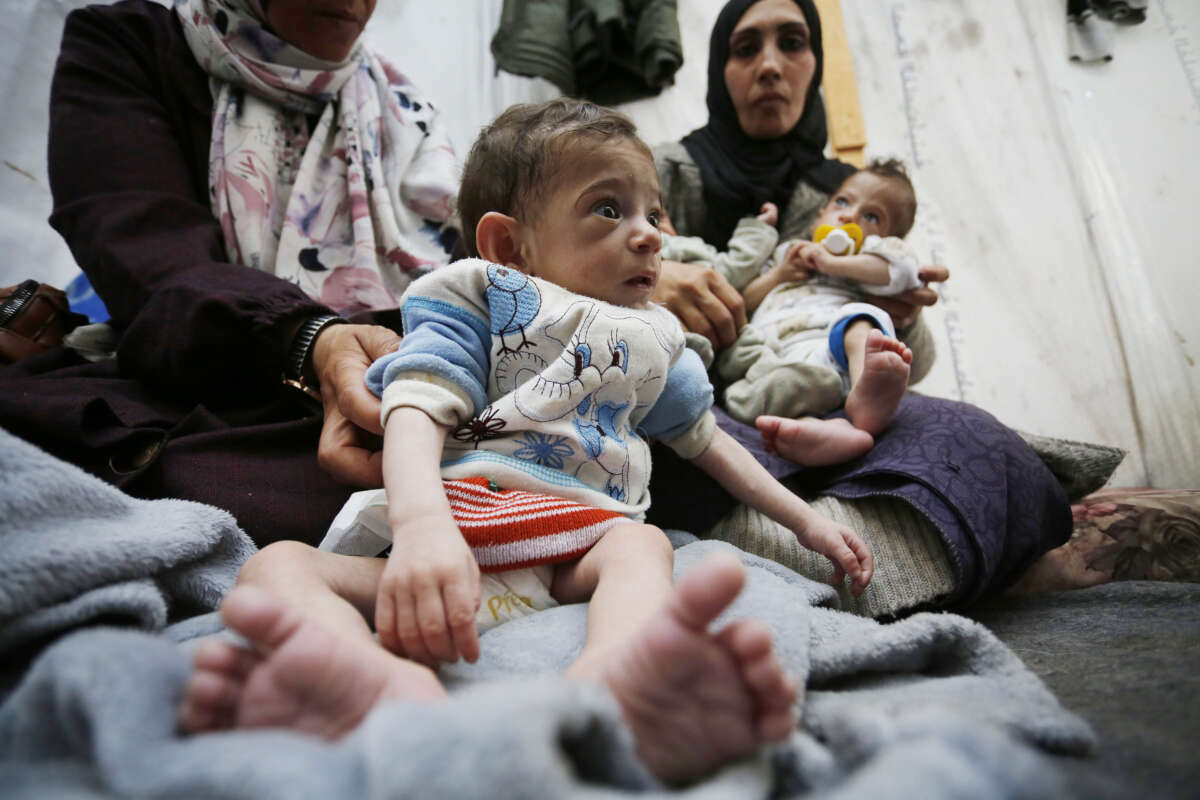Israel’s starvation campaign in Gaza is continuing to kill Palestinian children, with many starvation deaths likely going uncounted as international food security experts are warning that Israel’s siege and restrictions on humanitarian aid are forcing half a million Palestinians to undergo famine-level hunger.
Al Jazeera reported on Tuesday that, this week alone, four children have died in northern Gaza due to hunger. This includes one newborn baby who died of malnutrition before her parents even got the chance to name her, the outlet says.
The hunger situation in northern Gaza has slightly eased due to a small increase in humanitarian aid reaching the region; a northern crossing has been open for several weeks after Israeli forces shut down the Rafah crossing in May, cutting off what had been the largest entry point for humanitarian goods. Last month, World Food Programme Chief Cindy McCain had said that northern Gaza was undergoing a “full-blown famine.”
The crisis is still very much ongoing in the northern region, even with some increases in aid; a UN-backed preliminary report on food insecurity in Gaza released Tuesday warned that the entire strip is under a hunger “emergency,” with nearly 500,000 people, or about a quarter of the population of Gaza, undergoing famine-level hunger — the worst level of food insecurity.
This is down from previous estimates of famine-level hunger in Gaza by the group, but that doesn’t mean that the humanitarian crisis is easing; rather, the report suggests that it’s merely shifting. The report, by the Integrated Food Security Phase Classification (IPC), warned that the risk of famine remains “high” across the entire strip.
“The humanitarian space in the Gaza Strip continues to shrink and the ability to safely deliver assistance to populations is dwindling,” says the report. “The recent trajectory is negative and highly unstable. Should this continue, the improvements seen in April could be rapidly reversed.”
Households are having to resort to desperate means to survive, with more than half reporting that they’ve had to sell clothes for money and a third saying they’ve resorted to picking up trash to pawn off, the IPC found. Meanwhile, over half of households say they don’t have any food stored in their homes or shelters, while 20 percent say they are going entire days without food.
This has led to horrific circumstances for families across the strip who are reporting having to watch their children waste away from a lack of food, their bodies deteriorating into nothing more than skin and bone, with no options to treat them. Last week, the UN Relief and Works Agency for Palestine Refugees (UNRWA) reported that at least 50,000 children across the strip desperately need treatment for acute malnutrition, but have few options for care due to Israel’s destruction of the Gaza health system.
For months, Israel has been under binding orders from the International Court of Justice to increase humanitarian access in Gaza. But Israeli officials have openly defied those orders, and the amount of humanitarian aid entering Gaza is at its lowest point of the genocide so far.
Israel’s concerted attacks on humanitarian aid workers and Palestinians in line to receive aid are only worsening the catastrophe. The UN has reportedly warned Israel that it will be forced to stop operations across Gaza if it doesn’t improve humanitarian access and safety for aid workers.
Experts have said that the results of the latest IPC report in combination with the rapid deterioration of conditions across Gaza are a show that Israel has direct control over the resources to save Palestinian lives in Gaza and is choosing to deprive Palestinians of those resources.
“What [the report] reveals is that famine outcomes are very directly tied to the level of aid obstruction vs aid access. When Israeli government actions impede aid, there is a direct impact on starvation; and when they remove impediments, there is a direct link to improvements,” wrote Refugees International President Jeremy Konyndyk on social media on Tuesday.
“Famine temporarily deferred is not mission accomplished; it’s mission ongoing,” Konyndyk continued. “Ultimately, a cease-fire remains the only way to reliably avert a famine.”
Press freedom is under attack
As Trump cracks down on political speech, independent media is increasingly necessary.
Truthout produces reporting you won’t see in the mainstream: journalism from the frontlines of global conflict, interviews with grassroots movement leaders, high-quality legal analysis and more.
Our work is possible thanks to reader support. Help Truthout catalyze change and social justice — make a tax-deductible monthly or one-time donation today.
